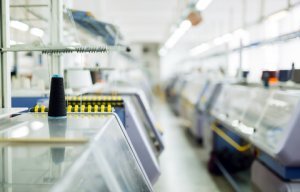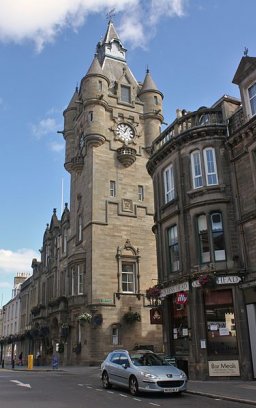
Scottish Borders seeks next generation knitwear workers
Scotland’s luxury knitwear manufacturing sector is not expected to return to full capacity until 2022, partly because stores that have been closed will still have inventory to sell.

8th January 2021
Knitting Industry
|
Hawick, Scotland
Scotland’s knitwear manufacturers have proved their resilience during the coronavirus, but the industry now faces further challenges as it seeks to restock stores that still have a backlog of inventory. In an industry hardened by decades of challenges and reorganisation, long established Hawick based companies like Johnstons of Elgin and Hawico were well placed to tackle the impact of the virus on both their manufacturing and selling luxury knitwear.
According to an article in The Herald, a leading Glasgow based newspaper, the sector has seen business greatly reduced and it is not expected to return to full capacity until 2022, partly because stores that have been closed will still have inventory to sell. From a retail point of view, when stores have been open, sales have been encouraging, The Herald reports.
The danger is, as balance sheets have been squeezed, that ability to invest gets restricted, so my big ask for the governments would be increased support on investment
Simon Cotton, chief executive of Johnstons of Elgin, told the newspaper that the sector has worked hard to minimise the fall-out from coronavirus but faces further challenges ahead.
“We’ve seen reductions certainly and we’ve seen difficulties, but nothing like on the scale I expected. I think the reason why is that the sector is incredibly resilient now,” he said.
“The companies have got ownership structures in particular that generally helps with that, so they are not using big borrowing, they’ve got good balance sheets,” headed. Mr Cotton said the industry had, until last year, been on the rise.
“Not that it is not without challenges, of course it is, given that obviously we’ve got Covid, we’ve got the Boeing aircraft tariffs in place for knitwear over a year at 25%, and then we have the elimination of VAT-free on January 1.”
He said both the UK government and the devolved Scottish government have a long-term role to play in paving the way for future investment.
“Any manufacturing industry, but particularly textiles, needs to continually invest to keep ahead of technology and international competition,” he said. “The danger is that as balance sheets have been squeezed that ability to invest gets restricted, so my big ask for the governments would be increased support on investment.”
“Yes, we’ll get through it but if we don’t invest, in 10, 15 years, that’s when you’ll see the real casualties. So, support to encourage investment and make it possible is the big ask there.”
“It is an industry which involves export, he said, so a lot of companies are already used to dealing with buyers in countries on a third-party basis.”
“With coronavirus, generally speaking a lot of companies are facing round about 40% reductions in demand this year and expecting it to still be significantly suppressed next year, because retailers have still got inventories to work through”.
Mr Cotton told The Herald that sees it probably getting to 2019 levels by 2022. “The big thing that will hold us back is those inventories,” he added.
“There will be elements of it that we are not sure what will happen. The decision to remove VAT-free shopping means that international visitors coming into the UK are less likely to buy luxury garments because very often the Asian travellers who are doing a tour of Europe and will shop in Paris rather than the UK because they know they can’t claim the VAT back here, but they can in Paris.”
Simon Cotton’s comments were echoed by Ewan Thomson of Hawico. Mr Thomson told the newspaper: “Like all businesses it has been an unbelievably challenging year for us,” Mr Thomson said. “Last year [2019] was a perfectly good year, we were set up for [2020] then obviously it all tipped upside down.”
“From our point of view there are two sides, the retail side and then the manufacturing side here in Hawick.”
He said that “the practicality is good, but you have a double whammy when this kind of things happens.”

“Basically, we furloughed things down, mothballed for a bit and then gradually re-emerged,” he said. “By the time we got to the middle of the year things started to look a bit better, particularly our European stores – the Swiss and German stores had reopened and actually were trading OK.”
“We have set up an online business, it has finally forced us to go online, and that has been trading quite well, particularly in the last two months.”
“In the mill we supply not just the stores but also a range of wholesale suppliers in America and Asia and again signs of life were starting to appear and gradually it has tightened up as the year has gone on and the virus has expanded.”
“When the stores are opening, they are trading, and people still want our products. We rely heavily on tourism and that was just turned off. The likes of Edinburgh contrarily continue to be a complete disaster zone. It has gone from being so good over the last three or four years. Our feeling is that the UK has been harder hit. Maybe it is because for the likes of our Edinburgh store we are more reliant on international visitors.”
“The message at the turn of the year is one of, yes, it’s been a challenging year, yes, we were well financed going into it, as we come out of it we absolutely see customers want to buy our products, there is a demand there for that and as we re-emerge into what I suspect will be a very different retail scene we are well-placed to take advantage of that,” Mr Thomson concluded.

Business intelligence for the fibre, textiles and apparel industries: technologies, innovations, markets, investments, trade policy, sourcing, strategy...
Find out more